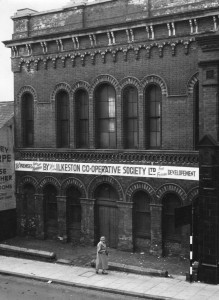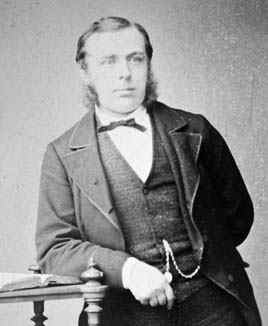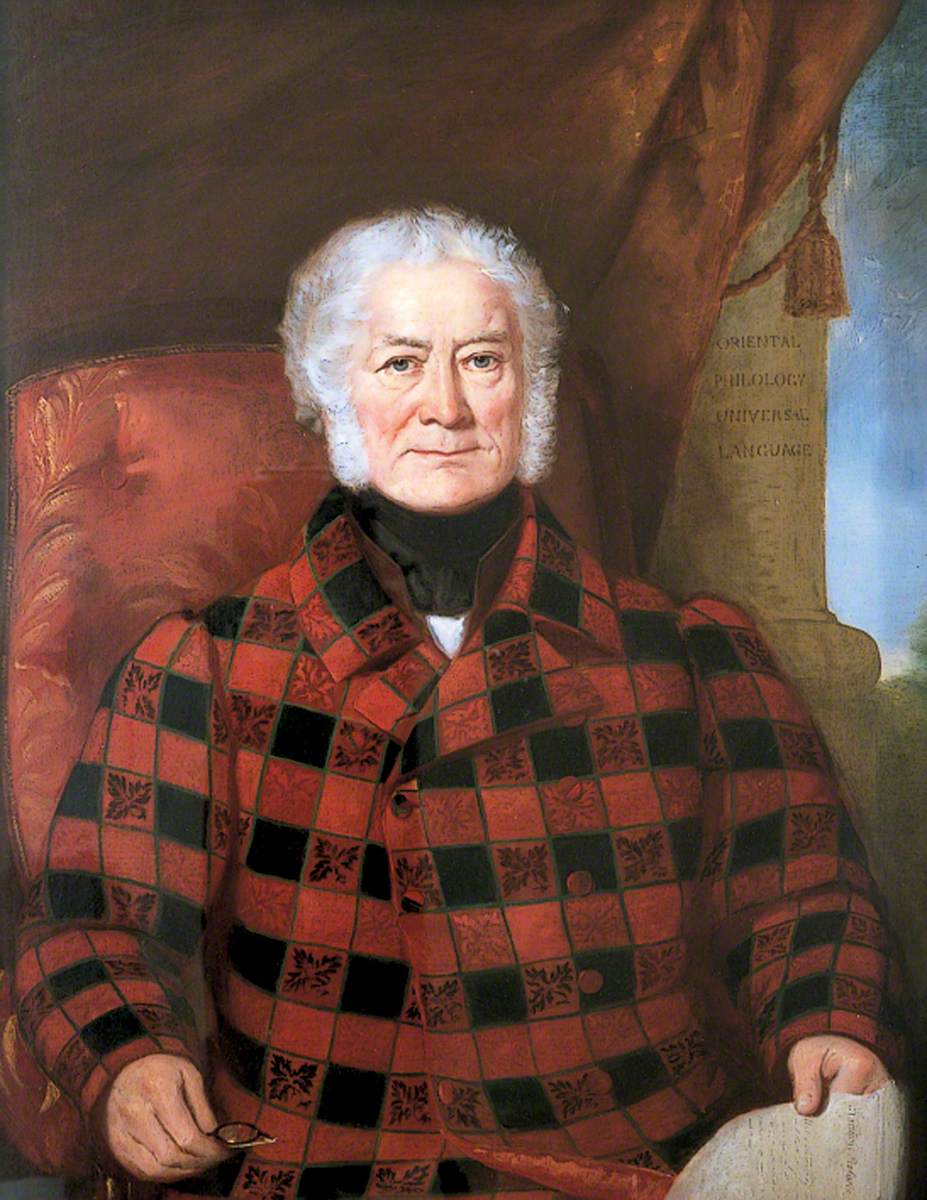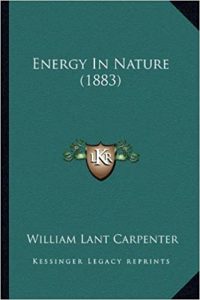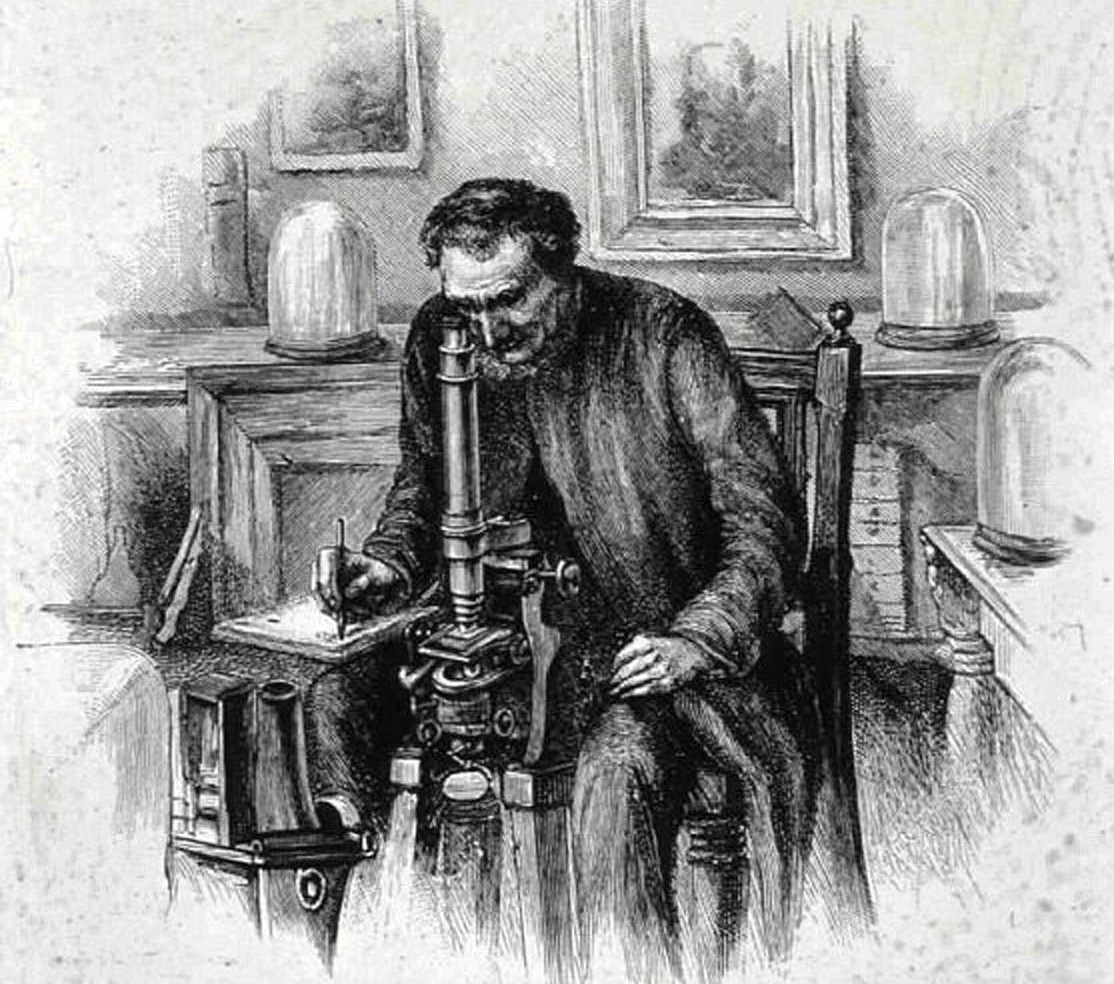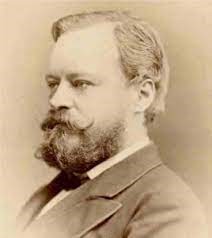Adeline points out that … “Gregory’s orchard next to their shop was bought by the U.M.F. Church, and South Street Schools were erected on the land.
“The Cricket Ground Chapel ceased to be the South Street Sunday School in 1867, when the scholars were transferred to the new South Street Schools, and the dear old chapel was closed. I cannot say that I enjoyed the change.”
The old Wesleyan Sunday Schoolrooms
The Cricket Ground Chapel is also referred to by Adeline as the Old Justice Room and was also known as the Old Meeting Room.
It was not far away from where we are now, on the opposite side of South Street, down Burgin Yard — what is now Coronation Street.
It would stand at the south east end of that yard — under what is now the car park of the Ritz bingo hall.
After its use as a chapel, it became a joiner’s shop belonging to William Warner and by 1917 was a garage.
On April 12th 1860 Ilkeston held its first Petty Sessions in the old Cricket Ground Chapel, now Sunday School.
At the end of that occasion the five magistrates – Sir Henry Sacheverell Wilmot, Bart., John ‘Jackie’ Radford, William Drury Lowe, Robert Wilmot, and Meynell Mundy – accompanied by prominent local businessmen retired to the Sir John Warren ’for refreshments’.
“The magistrates expressed themselves well pleased with their reception, and the efforts of the committee in procuring a suitable building for magisterial purposes; and after mutual congratulations the magistrates departed. The bells rang merry peals during the day in celebration of the establishment of Sessions at Ilkeston”. (DM)
Thenceforward the Chapel was also referred to as the (old) Justice Room.
Sessions were held every alternate Thursday.
Previously Smalley had been the location.
The new Wesleyan Sunday Schoolrooms
Adeline has much to tell us about these premises .. she is very familiar with them.
“The new (South Street) schoolroom seemed too large, and inhospitable, but we were very crowded in the old chapel, and it had been decided that a larger room would be beneficial in many ways. If I had been a wealthy woman, instead of a scholar, I would have bought the dear old chapel, and converted it into a shrine, because of the beautiful memories connected to it.”
According to Trueman, the South Street Sunday School was built in 1864, in close proximity to the Market Place, costing £1000 and designed by Mr. William Warner…. “a large and ornamental building, of a mixed style of architecture” — where the Co-op Supermarket now stands.
The School Rooms in October 1957 (courtesy of Ilkeston Reference Library).
The United Methodist Free Church Sunday School rooms at South Street were opened on Monday, May 15th 1865, when the Ilkeston brass band played throughout the town and the church bells rang in honour of the occasion. Erected by Messrs Isaac Warner and Son of Ilkeston, at a total cost of £1270, the Pioneer described the building as the finest in the town, “an ornament to it .. … perfect in every convenience within, as it is in architectural beauty without”. Its beauty emanated from its edifice “of deep red brick with red Mansfield stone dressings, and terracotta and encaustic enrichments in front”.
On the ground floor, two rooms looked out on to South Street. Behind them was a larger room — holding at least three hundred persons at the opening tea meeting — with four smaller classrooms surrounding it. The upper room was the most striking for its size and proportions, being 70 feet long and 36 feet wide, and “will prove exceedingly useful in holding large Sunday School gatherings or other assemblies”.
A great champion of the building and an indefatigable money-raiser in its cause was Samuel Carrier of East Street, who had died in January of 1865. His name and efforts were recalled at the evening opening meeting and were met with cheers from the audience.
Richard Daykin was superintendent for the school on alternate Sundays.
(It was at this time that Adeline’s brother, Martin, served as a teacher at the school).
A couple of visiting preachers
Preacher Jimmy Dupe
“One Sunday morning, soon after we had removed to the new school, Jimmy Dupe, of Nottingham, who was appointed to preach at South Street Chapel, came with some friends into the schoolroom. They had flags and banners with them, and were singing revival hymns. They walked with the scholars to the chapel, where Jimmy preached. He took for his subject David before the ‘Ark of God’. During the service Jimmy began to sing:
‘There was a man of old renown, King David was his name,
He danced before the Ark of God, And I can do the same.’
“Jimmy danced round the pulpit as he sang, and I could not help wondering what would happen if the pulpit door came unfastened, and Jimmy disappeared down the stairs. But all went off safely.”
Son of wool comber John and Elizabeth (nee Ingham), Leicester-born James ‘Jimmy’ Dupe led a band of Nottingham revivalists in the 1860’s. He was manager of the rented Park Row Chapel and also a pork butcher on Derby Road in the city.
On March 5th 1868, a band of revivalists led by Mr. James Dupe held their religious services at the Nottingham Circus. (IP)
“Jimmy used to hold what he called his ‘Harvest Festival’ at Nottingham. On the Sunday evening after Goose Fair had ended, he would hold a service on a stage of one of the shows, kindly lent to him for the purpose. This he would decorate with vegetables, etc., and he always had a good audience.
“One Sunday evening I attended his festival, and during the service, a man called out, ‘Jimmy, your chapel wants whitewashing, shall I do it for you?’
Jimmy said ‘Yes.’
The man said, ‘Where shall I begin?’
Jimmy replied, ‘On the ceiling.’
The people laughed. The man was silenced.”
On the afternoon of Goose Fair Sunday 1873 Jimmy held a service in front of Messrs. Patch and Bennett’s Acting Show in the Nottingham Market Square before a large crowd, most but not all of whose members were disposed to listen with attention to the speakers.
And he was in the same place at the same time in the following year.
In November 1873 Jimmy was in Ilkeston with ex-bare-knuckle boxer and Revivalist, William Abednego ‘Bendigo’ Thompson and ‘converted’ collier Richard Weaver, and held three crowded services in the Town Hall.
And he was not the only evangelist to try to make his impression on Ilkeston.
Fiddler Joss
In the summer of 1867 into Ilkeston with great fanfare came the evangelist ‘Fiddler Joss’ alias Joshua Poole, ‘the famous man of God’, — an epithet used by some Methodists when referring to Joss, and repeated by the Pioneer in its columns — though with a different tone.
Born in Skipton, Yorkshire in 1826, son of saddler Thomas and Ann, Joss had been a Sunday school teacher in his youth but then followed a dissolute life which was initially to lead to prison and then to redemption.
As a young man he got into ‘bad company’, left home and adopted a travelling life visiting Ireland, the Isle of Man and Cumberland, frequenting beerhouses, playing the fiddle to earn money, much of which he spent gambling or drinking away.
In 1850 he married Primitive Methodist local preacher, assistant class leader and Sunday school teacher Mary Woolham, daughter of William and Mary, but Joss’s drunken and violent behaviour towards her resulted in a six-month term in Wakefield prison.
The influence of his prison officers led to a religious reawakening and Joss left prison as a pledged teetotaller, determined to work hard and, with his wife, to ‘preach the Gospel in a simple way’, hoping that others would learn from his past mistakes.
And thus in July 1867 the South Street Chapel school rooms played host for a month to well-attended services led by Joss and ‘wifey’. Large placards publicised his arrival and the sermons, love feasts and other services which were to be held.
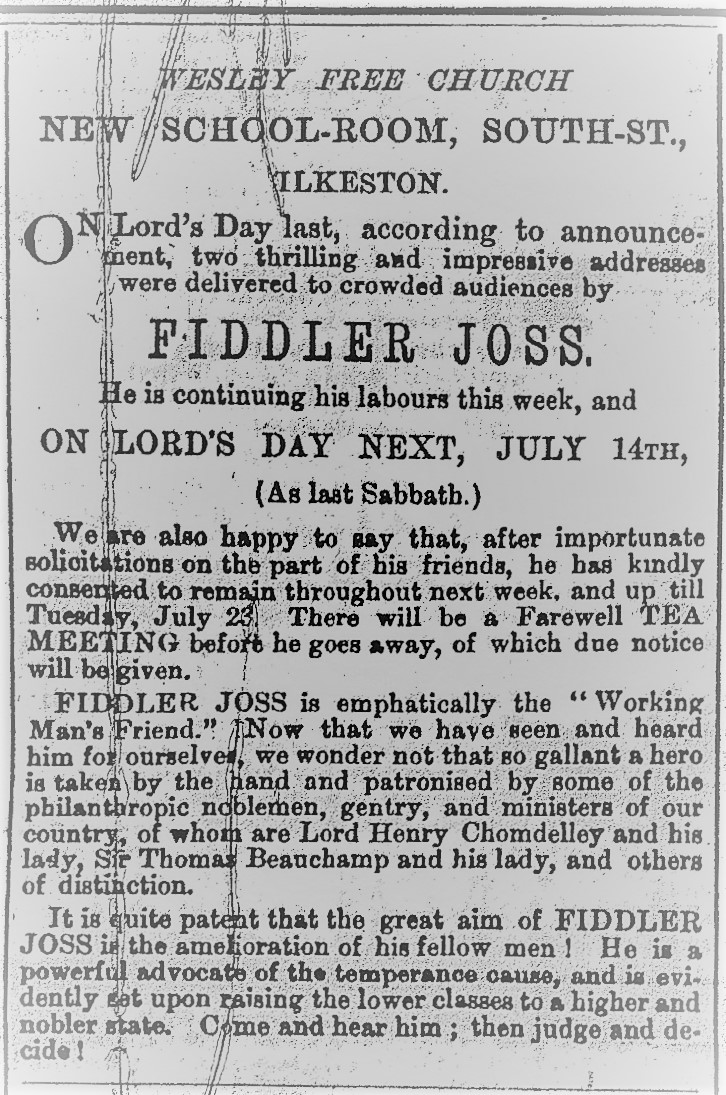 the Ilkeston Pioneer July 11th 1867
the Ilkeston Pioneer July 11th 1867
The Pioneer was scathing and hinted at trouble to come.
“This pretentious and florid announcement, heralding the approach of the Champion of Teetotallers, appears to have been accepted by the ‘drinking interest’ as a challenge, and to have put them ‘on their mettle’’’.
Old Resident recalled that it was usual for a band of members of the United Methodist Free Church to parade the streets of Ilkeston prior to a service, publicising the event, and one such advance party was sent out early on the Sunday morning to scout the territory. This band consisted of ‘Hallelujah’ men, wearing caps encircled by a yellow stripe and singing lustily as they strode into the Market Place to halt provocatively before two of the main inns in that area. There they proceeded to rant against publicans in general and these two ‘pubs’ in particular.
On the following Tuesday evening the ‘Jossites’ sallied forth once more, only to engage in conflict at the Old Harrow Inn with members of a circus based in the inn-yard at that time.
The ‘Big Top’ had been pitched in Aldred’s Yard. The circus performance was shortly to begin when the marching band of Methodists arrived and parked itself directly opposite the tent’s entrance to commence its ‘religious devotions’.
Well, red rag to a bull, and all that!!
The ‘friends of Bacchus’ allied themselves with the circus troupe which sent out its band carriage to engage in battle with the ‘admirers’ of Fiddler Joss.
“The bugle sounded, the drums beaten, and the contest commenced in real earnest. Tin pans or anything with which a noise could be created were also brought into full-play, the result being a veritable pandemonium. Eventually the band led by Joshua were compelled, after receiving a few parting sods, to retire crestfallen from the field, being unable to make their melodious voices heard above the din made by the circus men”.
The Jossites “bore the taunts and jeers of the multitude with patience, and what appeared at one time likely to end in a riot, terminated peacefully”.
This was a retreat however — but not a defeat.
The Pioneer was in preaching mode and thought a sermon from itself was in order at this time.
“We intreat our teetotal friends not to damage a good cause by intemperance in language or conduct. Rightly conducted their society may do much good, and will receive very general support. On the other hand, the ‘drinking interest’ ought not to interfere with the street processions of the ‘Jossites’. Such proceedings will never advance their interests with the thinking and respectable part of society. We cannot help think that the ‘Jossites’ would do well, under the circumstances, to confine their meetings to the spacious rooms at their command, or at all events to avoid processioning and singing in the streets. Were all religious denominations in the town to do the same, what confusion should we have! It would indeed tend to riot. And if teetotallers are to be allowed to obstruct the streets in favour of their cause, the drinking interest may very probably feel themselves entitled to take the same course, and we shall then have frequent repetitions of the disgraceful scene witnessed on Tuesday evening, but most probably resulting in consequences which all parties would deprecate, and all ought to assist in preventing”.
Some sarcastic prankster had hired the bellman to go around the town during the following morning, announcing that all drunkards were invited to Wesley Chapel next Saturday evening, at seven o’clock, and join Fiddler Joss ‘to partake of a good supper of beef and coffee’.
Again the pious Pioneer thought a few words in an editorial were called for. Whether this announcement “be regarded as an insult to the drinking interest or a hoax for the ‘Jossites’, it is equally reprehensible. It is to be hoped parties will refrain from indulging in such foolish amusements, provocative as they must be of nothing but ill-feeling and angry recrimination”.
William Somers of High Street, West Bromwich felt deeply grieved to read of the treatment of Fiddler Joss and his abstaining brotherhood at Ilkeston and wrote to the Pioneer to express his views a few days later.
“Do the people of Ilkeston really know and understand who they have amongst them in the person of Mr. Poole? Joshua Poole is undoubtedly one of the greatest and most remarkable of living men in this day, (in the sphere of life to which he is now called,) whether the good people of Ilkeston know it or not. The town of Bradford, the county of York, yea, even England itself may be proud of the man. Wherever he goes, and whatever town he enters, at his departure therefrom the grief of the people is more than my pen can describe, in fact, all feel they have lost a most valued minister, an ever ready and willing helper and counsellor, and a loving and sincere friend. No man ever laboured more arduously for souls, or with so much success in winning them over to Christ, in this town, than Joshua Poole, and his beloved and highly gifted wife, in the few weeks we had, I say, the honour and privilege of the presence of two such evangelists. They were no drivelling drones whilst here, but downright hard workers in the cause of their Lord and Master. Night after night, for the space of six weeks, St. George’s Hall was filled, the people never growing weary, whilst hundreds could not gain admission. About 2,500 persons were gained to the cause of temperance, and, above all other considerations, hundreds were brought out of darkness to the light of God’s truth, and many of the worst characters are now walking honestly and soberly before God and man, living monuments to the unwearied zeal and love of Joshua Poole and his wife, and the help of the most High on their labours. They have left a magnificent character behind them in West Bromwich and the neighbouring town of Wednesbury. The people here will ever receive them with open arms of welcome, joy, and affection, and are only too glad to hear the announcement that they are coming once more to visit us. To Christian Ministers of every denomination, I would say, you are in duty bound, if you love your Lord and Master and the souls of your fellow men, to give the right hand of fellowship to these two noble and earnest labourers in the vineyard of Christ. “Charity is kind;” “Love is Godlike;” let it then be extended by the people of Ilkeston to one who will ever prove their friend, in the best sense of the word. Depend upon it, Joshua Poole’s heart desire and only aim is to raise the most degraded from moral despair to happiness and peace; to make the miserable home of the drunkard a p[lace of joy and comfort to himself, and a blessing to his family; and to raise the character and condition of his fellow man to all that is noble and good whilst here on earth, and to point him to a happy and everlasting home in the mansions of glory above. May God bless him in all his labours, and spare him many long years to advance the truth and lead poor lost sinners to the fountain of mercy”.
Old Resident frequently attended the ‘Jossite’ services and recalled one particular Sunday service.
“A number of converts from Derby came over to assist. I was much struck with what one of these reformed characters had to say. Speaking of his drunken days, he said they became so poor that ‘the mice stood with tears in their eyes on the pantry shelves’, and eventually they disappeared altogether. But since his conversion they had returned, and he was able to get his fill of suety pudding – for if there was anything in the world he was fond of it was suety pudding…. ‘Jimmy Dupe’ of Nottingham notoriety, also lent a hand; and there were lively times during the fiddler’s stay in Ilkeston”.
But not all the Ilkestonians who attended Joss’s services were impressed.
One who clearly didn’t appreciate or understand who they had amongst them was ‘Independent’, a regular letter-writer to the Pioneer, who had been to hear the ‘famous man of God’. He penned another contribution to the newspaper and wrote of the preacher’s ‘wildest gymnastics on the platform’, ‘running from one end to the other’, ‘crouching like a lion’, ‘springing like a tiger’, re-enacting his past debauched life with his wife and reciting ‘anecdotes of the most puerile character’.
“Like Captain Blazo (he) attempts to kick all the public-houses in Ilkeston to the other side of the equator… We see him in his shirt sleeves, surrounded by his “Glory Band” whose duty it appears to be to pass a glass of cold water from one to the other and cry out lustily at every slang term the “famous man of God” thinks fit to utter…..His manner is rude in the extreme, and he possesses neither education nor the common courtesies of ordinary life. He is more of a teetotaller than an evangelist, and on studying the lives of Whitfield, Wesley, and other eminent men of piety, we feel that the epithet — as applied to ‘Fiddler Joss’ is little less than a mockery of the Divine Being”.
However Joss’s services appear to have been a success with his intended audience and he laboured at Ilkeston for nearly a month ‘in the cause of Temperance and Christianity’. One of his last duties was to attend the annual Camp Meeting of the Ebenezer Chapel, held in Godfrey Beardsley’s field nearby. On his departure from the town he received a bronze time-piece, valued at £3, supplied by Bath Street watchmaker Joseph Carnill and presented by Bath Street fishmonger William Henshaw, a prominent member of what was called ‘the Mission Band’ or Life-boat Crew.
Joss promised to give the watch a prominent place in his Bradford home, at the side of his Bible (value £20).
———————————————————————————————————————————————————
The Gilchrist Lectures of 1887
Twenty years later — on January 20th, 1887 — the people of Ilkeston were treated to “the most interesting and attractive scientific address that has ever been delivered” in the town, as an audience of over 1000 people packed into the schoolrooms to listen to a lecture given by Sir Robert Stawell Ball, LL.D., F.R.S., Andrews Professor of Astronomy at the University of Dublin and Royal Astronomer of Ireland. He was here speaking in the first in a series of six lectures in connection with the Gilchrist Educational Trust, under the auspices of the Ilkeston Church Institute and Mechanics’ Institution, and his subject was “The Telescope and its uses”. Given in almost complete darkness, the talk was illustrated by a series of slides illuminated by a powerful oxy-hydrogen limelight lantern, skilfully manipulated by Mr. J. Roberts of Derby. Sir Robert “possessed more than an average share of the Irishman’s national humour; and his quaint, original method of placing facts within the grasp of his hearers was not only amusing but eminently successful from and educational point of view, and evoked repeated applause.” (DM)
After a lecture lasting an hour and a half, the audience left enthralled.
The Trust had been established by Edinburgh surgeon and educationalist John Borthwick Gilchrist who, in his will, established a trust to fund the delivery of courses of scientific lectures, by distinguished professors, to benefit the education of the working masses. And hence, the arrival of Professor Ball to South Street in January of 1887.
Early in the following month and before a crowded audience, William Crawford Williamson, LLD, FRS, professor of natural history and botany at Owens College in Manchester, arrived to enlighten the folk of Ilkeston on the “Earliest stages of the earth’s history”. In a wide ranging lecture, punctuated by ‘homely illustrations’, William expressed himself in favour of the theory that all life is preceded by life, as opposed to the theory of spontaneous generation.
And in the same month, and at the same location, a similar-sized audience listened, entranced, to William Lant Carpenter, B.A., B.Sc., manager of the School of Electrical Engineering in Hanover Square, London, as he gave his Gilchrist lecture on ‘Electrical energy and its uses’.
Chairman at the meeting was a prescient Alfred Edward Miller Mundy of Shipley Hall who, when introducing the guest speaker, expressed the hope that future coal miners would be able to use an electrical safety lamp, thus reducing the danger of explosions.
In March 1887 there followed a lecture by the Rev. Dr William Dallinger, President of the Royal Microscopical Society, entrancing (once more) an audience, by his “poetic descriptions of the marvellous development of those mysterious invisiblities known as ‘bacteria’ … assisted by some magnificent illustrations rendered by the aid of a powerful magic lantern (again provided by Mr. J.Roberts of Derby) … revealing the matchless grace and finish and beauty of the tiniest things created”.
Nothing compares with the perfection and completeness of Nature.
Image (left) modified from one by Dr Jurriaan de Groot
In March the guest was Professor Harry Govier Seeley, FGS, FRGS, geography professor at King’s College, London, his subject being “Water and its work in earth shaping”
The oxy-hydrogen lantern was used to illustrate the subject
No mention of displaying dinosaur bones, despite Harry’s extensive fossil collection.
And once more Ilkeston offered up a large attendance.
——————————————————————————————————————————————————
Ten years later, a series of similar Gilchrist lectures, four in all, was enjoyed by the town, this time at the Theatre Royal in Lord Haddon Road.
——————————————————————————————————————————————————
We now walk past the Sunday School rooms — the erstwhile Gregory’s orchard — to a row of three shops.

